- Home
- Jonathan Stroud
The Golem's Eye Page 2
The Golem's Eye Read online
Page 2
My master bared his teeth. “By then the Emperor will be gone. And that, incidentally, is my new charge for both of you—to guard His Highness during his escape. Understood?”
I held up a paw. The magician gave a heartfelt sigh. “Yes, Bartimaeus?”
“Well, sir,” I said, “if I might make a suggestion. Prague’s surrounded. If we try to escape the city with the Emperor, we’ll all die horribly. So why don’t we just forget the old fool and slip away instead? There’s a little beer cellar on Karlova Street with a dried-up well. Not deep. The entrance is a bit small, but—”
He frowned. “You expect me to hide in there?”
“Well, it would be tight, but I reckon we could squeeze you in. Your pot belly might give us trouble, but it’s nothing a good shove wouldn’t fix—Ow!” My fur crackled; I broke off sharpish. As always, the Red-hot Stipples made me lose my train of thought.
“Unlike you,” the magician snarled, “I know the meaning of loyalty! I do not need to be compelled to act honorably toward my master. I repeat: you are both to guard his life with your own. Do you understand?”
We nodded reluctantly; as we did so, the floor shook with a nearby explosion.
“Then follow me,” he said. “We don’t have much time.”
Back up the stairs we went, and through the echoing corridors of the castle. Bright flashes illuminated the windows; fearsome cries echoed all around. My master ran on his spindly legs, wheezing with each step; Queezle and I loped alongside. At last we came out onto the terrace where for years the Emperor had maintained his aviary. It was a large affair, delicately constructed from ornate bronze, with domes and minarets and feeding ledges, and doors for the Emperor to stroll between. The interior was filled with trees and potted shrubs, and a remarkable variety of parrots, whose ancestors had been brought to Prague from distant lands. The Emperor was besotted with these birds; in recent times, as London’s power grew and the Empire slipped from his hands, he had taken to sitting for long periods within the aviary, communing with his friends. Now, with the night sky rent by magical confrontation, the birds were in panic, swirling around the cage in a flurry of feathers, squawking fit to burst. The Emperor, a small plump gentleman in satin breeches and a crumpled white chemise, was little better off, remonstrating with his bird handlers and ignoring the advisors who massed about him.
The Chief Minister, Meyrink, pale, sad-eyed, was plucking at his sleeve. “Your Highness, please. The British are pouring up Castle Hill. We must get you to safety—”
“I cannot leave my aviary! Where are my magicians? Summon them here!”
“Sir, they are engaged in battle—”
“My afrits, then? My faithful Phoebus …”
“Sir, as I have already informed you several times—”
My master shouldered his way through. “Sir: I present Queezle and Bartimaeus, who will assist us in our departure, then save your wondrous birds as well.”
“Two cats, man? Two cats?” The Emperor’s mouth went all white and pursed.9
Queezle and I rolled our eyes. She became a girl of unusual beauty; I took Ptolemy’s form. “Now, Your Highness,” my master said, “the eastern steps …”
Great concussions in the city; half the suburbs were now alight. A small imp came bowling over the parapet at the end of the terrace, its tail aflame. It skidded to a halt beside us. “Permission to report, sir. A number of savage afrits are fighting their way up to the castle. The charge is led by Honorius and Patterknife, Gladstone’s personal servants. They are very terrible, sir. Our troops have broken before them.” It paused, looked at its smoldering tail. “Permission to find water, sir?”
“And the golems?” Meyrink demanded.
The imp shuddered. “Yessir. They have just engaged with the enemy. I kept well away from the cloud, of course, but I believe the British afrits have fallen back a little, in disarray. Now, about the water—”
The Emperor gave a warbling cry. “Good, good! Victory is ours!”
“The advantage is only temporary,” Meyrink said. “Come sir, we must go.”
Despite his protests, the Emperor was bundled away from the cage, toward a wicket gate. Meyrink and my master were at the head of the group, the Emperor behind, his short frame hidden among the courtiers. Queezle and I brought up the rear.
A flash of light. Over the parapet behind us two black figures came leaping. Tattered cloaks whipped about them, yellow eyes burned in the depths of their cowls. They moved across the terrace in great drifting bounds, touching ground only rarely. In the aviary, the birds fell into sudden silence.
I looked at Queezle. “Yours or mine?”
The beautiful girl smiled at me, showing her sharp teeth. “Mine.” She fell back to meet the advancing ghuls. I ran on after the Emperor’s entourage.
Beyond the gate, a narrow path followed the moat north, under the castle wall. Down below, the Old Town was on fire; I could see the British troops running through the streets, and Prague’s people fleeing, fighting, falling before them. It all seemed far away; the only sound that came to us was a distant sighing. Flocks of imps drifted here and there like birds.
The Emperor ceased his loud complaints. The group hurried in silence through the night. So far, so good. We were at the Black Tower now, at the top of the eastern steps, and the way ahead was clear.
A flutter of wings; Queezle landed beside me, ashen-faced. She was wounded in the side. “Trouble?” I said.
“Not the ghuls. An afrit. But a golem came, destroyed it. I’m fine.”
Onward down the stairs in the side of the hill. Light from the burning castle was reflected in the waters of the Vltava below, giving it a melancholy beauty. We met no one, no one pursued us, and soon the worst of the conflict was left behind.
As the river neared, Queezle and I gave each other hopeful looks. The city was lost, as was the Empire, but escape here would allow us some small restoration of personal pride. Although we loathed our servitude, we also thoroughly disliked being beaten. It looked as if we were going to get away.
The ambush came when we were nearly at the bottom of the hill.
With a scuttle and a rush, six djinn and a band of imps hopped out onto the steps below. The Emperor and his courtiers cried out and fell back in disarray. Queezle and I tensed, ready to spring.
A light cough behind us. As one, we turned.
A slim young man stood five steps above. He had tight blond curls, big blue eyes, and wore sandals and a toga in the late Roman style. He had a rather sappy, coy expression on his face, as if he couldn’t hurt a fly. However, as an extra detail that I couldn’t help but notice, he also carried a monstrous scythe with a silver blade.
I checked him out on the other planes, in the faint hope that he might actually be an eccentric human on his way to a fancy-dress party. No such luck. It was an afrit of some potency. I swallowed. This wasn’t good at all.10
“Mr. Gladstone’s compliments to the Emperor,” the young man said. “He requests the pleasure of his company. The rest of you rabble can make yourselves scarce.”
That sounded reasonable. I looked at my master beseechingly, but he furiously motioned me forward. I sighed, took a reluctant step toward the afrit.
The young man tsked loudly. “Oh, hop it, small-timer. You haven’t a chance.”
His derision stoked my fury. I pulled myself up. “Beware,” I said coldly. “You underestimate me at your peril.”
The afrit batted his eyelashes with an ostentatious lack of concern. “Indeed? Have you a name?”
“A name?” I cried. “I have many names! I am Bartimaeus! I am Sakhr al-Jinni! I am N’gorso the Mighty and the Serpent of Silver Plumes!”
I paused dramatically. The young man looked blank. “Nope. Never heard of you. Now if you’ll just—”
“I have spoken with Solomon—”
“Oh, please!” The afrit made a dismissive gesture. “Haven’t we all? Let’s face it, he got around.”
“I have rebuil
t the walls of Uruk, Karnak, and Prague—”
The young man smirked. “Prague? What, these ones here? The ones it took Gladstone five minutes to break down? Sure you didn’t work on Jericho, too?”
“Yes, he did,” Queezle put in. “One of his first jobs. He keeps quiet about it, but—”
“Look, Queezle—”
The afrit fingered his scythe. “Last chance, djinni,” he said. “Vamoose. You can’t win this one.”
I shrugged in a resigned sort of way. “We’ll see.”
And so, sad to say, we did. Very quickly, too. My first four Detonations were deflected by the twirling scythe. The fifth, which I’d made a real humdinger, rebounded directly at me, sending me crashing off the path and down the hill in a shower of essence. I tried to rise, but fell back in pain. My wound was too great; I could not recover in time.
Up on the path, the imps were pouring onto the courtiers. I saw Queezle and a burly djinni spin past, hands at each other’s throats.
With insulting nonchalance, the afrit ambled down the slope toward me. He winked and raised the silver scythe.
And at that moment, my master acted.
He’d not been a particularly good one, all told—he’d been too fond of the Stipples for starters—but from my point of view his last deed was the best thing he ever did.
The imps were all around him, vaulting over his head, ducking between his legs, reaching for the Emperor. He gave a cry of fury and from a pocket in his jacket produced a Detonation stick, one of the new ones made by the alchemists of Golden Lane in response to the British threat. They were shoddy, mass-produced rubbish, inclined to explode too fast, or often not at all. Either way, it was best, when using them, to throw them speedily in the general direction of the enemy. But my master was a typical magician. He wasn’t used to personal combat. He gabbled the Word of Command all right, but then proceeded to hesitate, holding the stick above his head and feinting at the imps, as if undecided which one to choose.
He hesitated a fraction too long.
The explosion tore half the stairs away. Imps, Emperor, and courtiers were blown into the air like dandelion seeds. My master himself vanished utterly, as if he had never been.
And with his death, the bonds that tethered me withered into nothing.
The afrit brought the scythe blade down, exactly where my head had lain. It drove uselessly into the ground.
Thus, after several hundred years and a dozen masters, my ties to Prague were broken. But as my grateful essence fled in all directions, and I looked down upon the burning city and the marching troops, on the wailing children and the whooping imps, on the death throes of one empire and the bloody baptism of the next, I must say I didn’t feel particularly triumphant.
I had a feeling it was all going to get a whole lot worse.
1
London: a great and prosperous capital, two thousand years old, which in the hands of the magicians aspired to be the center of the world. In size at least it had succeeded. It had grown vast and ungainly on the rich feasts of empire.
The city sprawled for several miles on either side of the Thames, a smoke-bound crust of housing, dotted with palaces, towers, churches, and bazaars. At all times and in all places, it thrummed with activity. The streets were clogged and crowded with tourists, workers, and other human traffic, while the air buzzed invisibly with the passage of imps busy about their masters’ errands.
On the crowded quays extending into the gray waters of the Thames, battalions of soldiers and bureaucrats waited to set sail on journeys across the globe. In the shadows of their ironclad sailing ships, colorful merchant vessels of every size and shape negotiated the cluttered river. Bustling carracks from Europe; sharp-sailed Arab dhows, laden with spices; snub-nosed junks from China; elegant, slim-masted clippers from America—all were surrounded and impeded by the tiny river-boats of the Thames watermen, who competed loudly for the custom of guiding them into dock.
Two hearts powered the metropolis. To the east was the City district, where traders from distant lands gathered to exchange their wares; to the west, hugging a sharp bend in the river, lay the political mile of Westminster, where the magicians worked ceaselessly to extend and protect their territories abroad.
The boy had been in central London on business; now he was returning to Westminster on foot. He walked at an easy pace, for though it was still early morning, it was already warm, and he could feel the sweat beading beneath his collar. A slight breeze caught the edges of his long black coat and whipped it up behind him as he went. He was aware of the effect, which pleased him. Darkly impressive, it was; he could sense heads turning as he passed. On really windy days, with his coat flapping out horizontally, he had the feeling he didn’t look quite so stylish.
He cut across Regent Street and down between the whitewashed Regency buildings to Haymarket, where the street sweepers were busy with broom and brush outside the theater fronts and young fruit sellers were already beginning to parade their wares. One woman supported a tray piled high with fine, ripe, colonial oranges, which had been scarce in London since the southern European wars began. The boy approached; as he passed, he flipped a coin dexterously into the small pewter bowl hanging from her neck and, with an extension of the same movement, plucked an orange from the top of the tray. Ignoring her thanks, he went his way. He did not break stride. His coat trailed impressively behind him.
At Trafalgar Square, a series of tall poles, each striped with a dozen spiraling colors, had recently been erected; gangs of workmen were at that moment winching ropes into place between them. Each rope was heavily laden with jaunty red, white, and blue flags. The boy stopped to peel his orange and consider the work.
A laborer passed, sweating under the weight of a mass of bunting.
The boy hailed him. “You, fellow. What’s all this in aid of?”
The man glanced sideways, noticed the boy’s long black coat, and immediately attempted a clumsy salute. Half the bunting slipped out of his hands onto the pavement. “It’s for tomorrow, sir,” he said. “Founder’s Day. National holiday, sir.”
“Ah yes. Of course. Gladstone’s birthday. I forgot.” The boy tossed a coil of peel into the gutter and departed, leaving the workman grappling with the bunting and swearing under his breath.
And so down to Whitehall, a region of massive gray-clad buildings, heavy with the odor of long-established power. Here, the architecture alone was enough to browbeat any casual observer into submission: great marble pillars; vast bronze doors; hundreds upon hundreds of windows with lights burning at every hour; granite statues of Gladstone and other notables, their grim, lined faces promising the rigors of justice for all enemies of State. But the boy tripped with light steps past it all, peeling his orange with the unconcern of one born to it. He nodded to a policeman, flashed his pass to a guard, and stepped through a side gate into the courtyard of the Department of Internal Affairs, under the shade of a spreading walnut tree. Only now did he pause, gulp down the remainder of his orange, wipe his hands on his handkerchief, and adjust his collar, cuffs, and tie. He smoothed back his hair a final time. Good. He was ready now. It was time to go to work.
More than two years had passed since the time of Lovelace’s rebellion, and the sudden emergence of Nathaniel into the elite. By now, he was fourteen years old, taller by a head than when he had returned the Amulet of Samarkand to the protective custody of a grateful government; bulkier, too, but still lean-framed, with his dark hair hanging long and shaggy around his face after the fashion of the day. His face was thin and pale with long hours of study, but his eyes burned hot and bright; all his movements were characterized by a barely suppressed energy.
Being a keen observer, Nathaniel had soon perceived that among working magicians, appearance was an important factor in maintaining status. Shabby attire was frowned upon; indeed it was a sure-fire mark of mediocre talent. He did not intend to give this impression. With the stipend that he received from his department, he had bought a ti
ght-fitting black drainpipe suit and a long Italian coat, both of which he considered dangerously fashionable. He wore slim, slightly pointed shoes and a succession of garish handkerchiefs, which provided an explosion of color across his breast. With this outfit carefully in place, he would walk around the Whitehall cloisters with a lanky, purposeful stride, reminiscent of some wading bird, clutching sheaves of paper in his arms.
His birth name he kept well hidden. To his colleagues and associates, he was known by his adult name, John Mandrake.
Two other magicians had borne this name, neither of great renown. The first, an alchemist in the days of Queen Elizabeth, had turned lead to gold in a celebrated experiment before the court. It was afterward discovered that he had managed this by coating gold pellets with thin films of lead, which vanished when gently heated. His ingenuity was applauded, but he was beheaded nonetheless. The second John Mandrake was a furniture-maker’s son who had spent his life researching the many variants of demonic mite. He had amassed a list of 1,703 increasingly irrelevant subtypes before one of them, a Lesser Frilled Green Hornetwing, stung him in an unguarded area; he swelled to the size of a chaise lounge and so died.
The inglorious careers of his predecessors did not concern Nathaniel. In fact, they gave him quiet satisfaction. He intended to make the name famous for himself alone.
Nathaniel’s master was Ms. Jessica Whitwell, a magician of indeterminate age, with cropped white hair and a frame that was slender, tending to the skeletal. She was reckoned one of the four most potent magicians in the government, and her influence was long. She recognized her apprentice’s talent and set about developing it fully.
Living in a spacious apartment in his master’s riverside townhouse, Nathaniel led an ordered, well-directed existence. The house was modern and sparsely furnished, its carpets lynx-gray and the walls stark white. The furniture was made of glass and silvered metal, and of pale wood felled in Nordic forests. The whole place had a cool, businesslike, almost antiseptic feel, which Nathaniel came to admire strongly: it signaled control, clarity, and efficiency, all hallmarks of the contemporary magician.

 The Leap
The Leap Buried Fire
Buried Fire Heroes of the Valley
Heroes of the Valley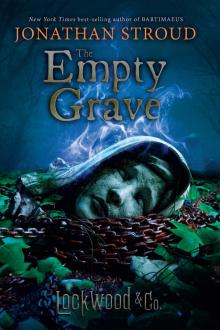 The Empty Grave
The Empty Grave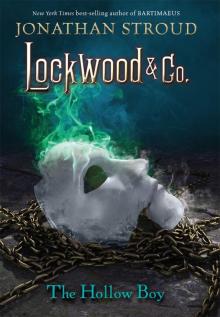 The Hollow Boy
The Hollow Boy The Last Siege
The Last Siege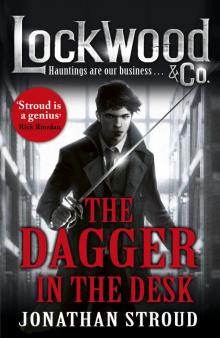 The Dagger in the Desk
The Dagger in the Desk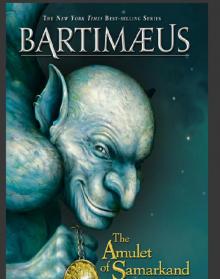 The Amulet of Samarkand
The Amulet of Samarkand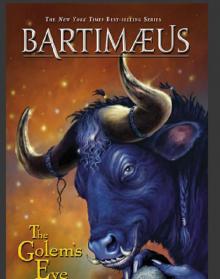 The Golem's Eye
The Golem's Eye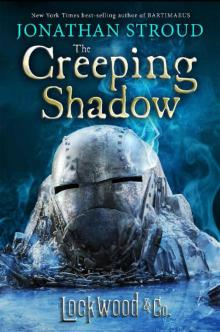 The Screaming Staircase
The Screaming Staircase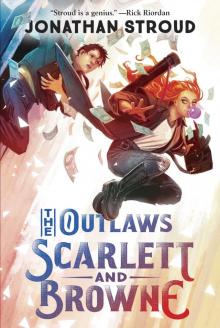 The Outlaws Scarlett and Browne
The Outlaws Scarlett and Browne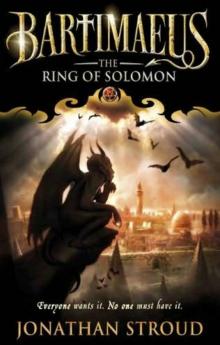 The Ring of Solomon: A Bartimaeus Novel
The Ring of Solomon: A Bartimaeus Novel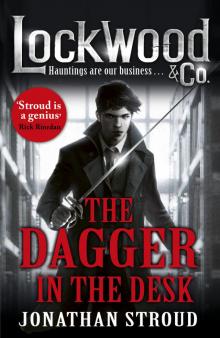 Lockwood & Co
Lockwood & Co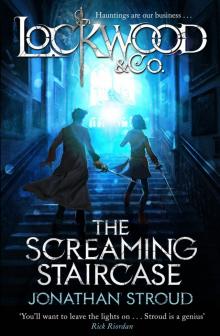 Lockwood & Co: The Screaming Staircase
Lockwood & Co: The Screaming Staircase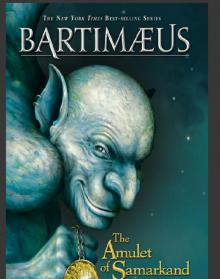 Bartimaeus: The Amulet of Samarkand
Bartimaeus: The Amulet of Samarkand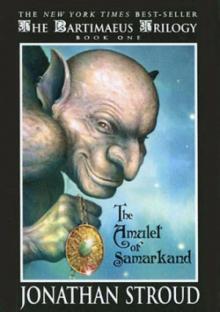 The Amulet of Samarkand tbt-1
The Amulet of Samarkand tbt-1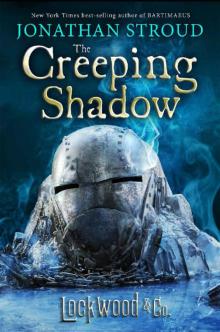 Lockwood & Co.: The Creeping Shadow
Lockwood & Co.: The Creeping Shadow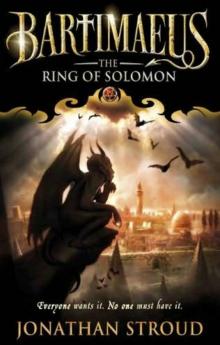 The Ring of Solomon
The Ring of Solomon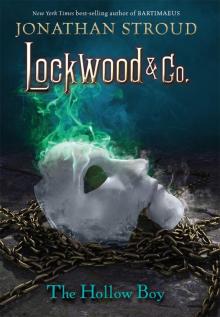 Lockwood & Co. Book Three: The Hollow Boy
Lockwood & Co. Book Three: The Hollow Boy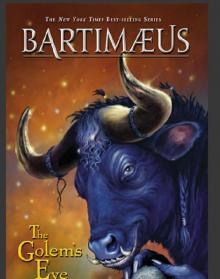 Bartimaeus: The Golem’s Eye
Bartimaeus: The Golem’s Eye